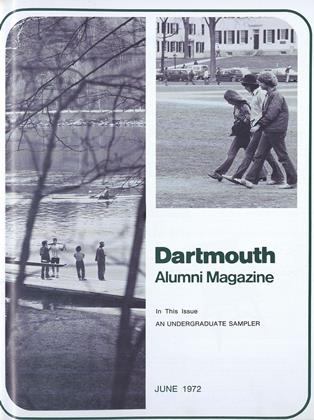By Lewis Meyer '34.Garden City, New York: Doubleday &Company, 1971. 216 pp. $5.95.
A fitting sequal to Preposterous Papa,Mostly Mama is about the author's Jewish mother and his own boyhood in North Texas and Oklahoma. In Taro, Texas, Annie Levy's family, with money and the self-assurance springing from vital attachments to places and people, considered her marriage to Max Meyer a step down. He was regarded as an interloper and upstart. So Annie and her husband settled in Sapulpa, Oklahoma, where Max ran a store, a gift from Mama's father. It was not Papa's chief interest, for, buying all the land he could, sometimes on borrowed money, he hoped to discover oil, and eventually he did.
Humorous and sentimental, the anecdotes about Mama are enjoyable. She was the cooking champion of Sapulpa, a real honor in cookery competition some fifty years ago in that small town. Her cookies and snacks were super-human, and her chicken noodle soup, able to pacify anyone with a tantrum from an irate Papa to an itinerant peddler, was nearly divine. '"Skim off the top so it'll be rich but not greasy," said Mama. She put her faith in goose grease and castor oil as cure-alls for children because children require discipline if little monsters are not to grow up into big monsters. Children won't remember what you did for them, she averred, but will never forget what you did with them. Parents, not children, must be the center of the universe.
Next to her family, Mama loved the Salvation Army, gave it clothes collected from Texas relatives, and donated fruits and vegetables she had canned. Although Papa Max disapproved of the Army as a Christian organization, the local chapter exalted Mama Annie as "the perfect example of a good Christian woman," and presented her with a medal of honor "for being a soldier of God."
A valued member of the Sapulpa Shakespeare Club, Mama could and would quote the Bard. The only thing she could not control was the automobile. She drove into neighbors' yards, plowed up lawns, and leveled rose bushes. But the neighbors forgave her because they loved her.
With a light touch, Lewis Meyer gives us a fresh portrait of a gallant woman and a happy, close-knit family, "set pieces" skilfully evoking the Southwest in the twenties and thirties, and proof that memoirs of a Jewish childhood may include more than standardized recollections of the Catskills, Odessa, and the Lower East Side.
An editor and critic, Mr. Potoker is AssociateProfessor and Chairman of the Departmentof English at the Bernard M. BaruchCollege of The City University of NewYork.
 View Full Issue
View Full Issue
More From This Issue
-
 Feature
FeatureThe Future of Liberal Arts Education at Dartmouth
June 1972 -
 Feature
FeatureDartmouth Men and the World: Three Views
June 1972 By ALBERT H. CANTRIL '62 I, THOMAS F. BOUDREAU '62 -
 Feature
FeatureRETIRING FACULTY
June 1972 -
 Feature
FeatureWhitman at Dartmouth—100 Years Ago
June 1972 -
 Feature
FeatureUNDERGRADUATE SAMPLER
June 1972 -
 Article
ArticleThe Myth of the Munich Analogy
June 1972 By STEPHEN C. THEOHARIS '71
EDWARD M. POTOKER '53
Books
-
 Books
BooksFACULTY PUBLICATIONS
March 1916 -
 Books
BooksTHE LETTERS OF EMILY DICKINSON.
OCTOBER 1958 -
 Books
BooksTHE PSYCHOLOGY OF SUCCESSFUL SELLING
July 1953 By C. L. STONE '17 -
 Books
BooksIT'S A FREE COUNTRY
October 1945 By Herbert R. West '22. -
 Books
BooksFurther Mention
March 1975 By J.H. -
 Books
BooksORBITER DICTA: OPINIONS, JUDICIOUS AND OTHERWISE, ON LAWYERS AND THE LAW.
JULY 1971 By ROBERT L. LOEB '21



